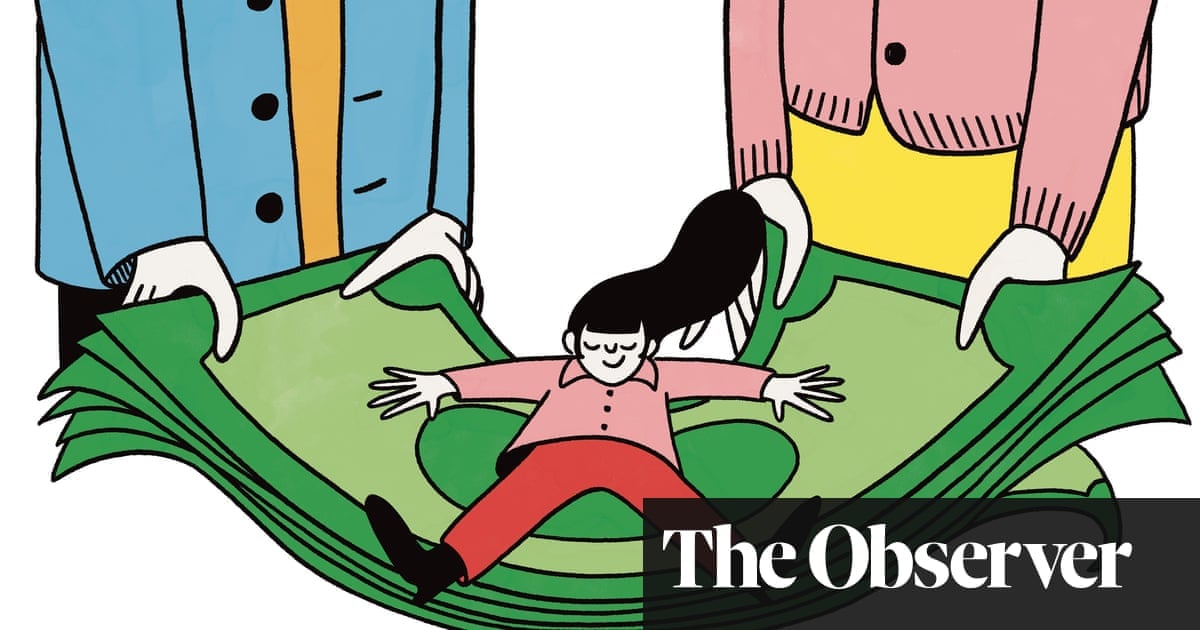- cross-posted to:
- [email protected]
- cross-posted to:
- [email protected]
You know the Bank of Mum and Dad when you see it: it’s your friend who seems broke, but always has a safety net, or who suddenly (but discreetly) acquires the deposit for a home. It’s those who stayed with their parents while they saved for a flat, or stuck it out in a profession they were passionate about even though the wages are chronically low. It’s those who do not need to consider the financial costs of having children. It’s those whose grandparents are covering nursery or university fees, with the Bank of Grandma and Grandad already driving an economic wedge between different cohorts in generations Alpha (born between 2010 and 2024) and Z (born in the late 1990s and early 2000s).
This is the picture we know, but the Bank of Mum and Dad is not just a luxury confined to the 1% – it is also evident in families like mine. I grew up in a working-class household and was the first person in my family to get a degree, but it was the fact my parents had scrimped in the 1980s to purchase properties in London (and allowed me to crash in one throughout my 20s) that has arguably been the true source of opportunities in my life.
In recent years, we have rightly widened the conversation about privilege in society. And yet how honest are we about one of the most obvious forces shaping anyone under 45: the presence or absence of a parental safety net? The truth is that we live in an inheritocracy. If you’ve grown up in the 21st century, your opportunities are increasingly determined by your access to the Bank of Mum and Dad, rather than by what you earn or learn. The economic roots of this story go back to the 1980s, but it accelerated after the 2008 financial crisis, as private wealth soared and wage growth stalled. In the 2020s, rather than a meritocracy – where hard work pays off – we have evolved into an inheritocracy, based on family wealth.



This part in particular I find to be a strange thing to complain about… Like, some people have the option of living with their parents, so what…?
This fantasy that everyone moves out of their parents’ house and becomes totally independent the day they turn 18 is just another bullshit American dream that has little basis in reality. If you happen to have the privilege of your empty childhood bedroom in your parents house, and you have a good enough relationship with your family to make it work while you follow a vocation or save up money for later, that’s not something to be ashamed of–it’s making the best of your circumstances and being smart with how you spend money.
Remember kids: there’s no magical stat bonus for adult dignity in giving half of your monthly wages to some asshole landlord if you don’t have to, so don’t let people shame you out of living with family in a multi-generational household like so many people do relatively happily in countries all over the world.
Yes, it’s true that not everyone has that privilege (a good relationship with their parents, an extra bedroom to sleep in, etc.), but as long as you’re contributing (financially or otherwise) to the shared household in some way, there’s no more shame in living with your parents than their is living with non-family roommates, a spouse, or whatever.
I think most people, whether they’ve experienced it or not, would agree that the privilege of living with your parents isn’t exactly a luxury or an ideal way to live, but there really is no shame in it. If you’re a good person who works hard and are only able to save up enough money to work towards your goals because you save money on rent by living with family, doing something like saving up for a house is still a big achievement and nobody should try to take that away from you.
Imagine being butthurt about people who live with their fucking parents and not laser-focused on the fact that a 0.1% of people have 99.9% of the money in society. It’s fucking nuts.